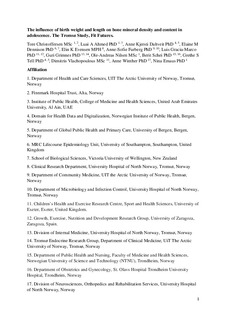The influence of birth weight and length on bone mineral density and content in adolescence: The Tromsø Study, Fit Futures
Christoffersen, Tore; Ahmed, Luai A.; Daltveit, Anne Kjersti; Dennison, Elaine; Evensen, Elin; Furberg, Anne-Sofie; Gracia-Marco, Luis; Grimnes, Guri; Nilsen, Ole-Andreas; Schei, Berit; Tell, Grethe S.; Vlachopoulous, Dimitris; Winther, Anne; Emaus, Nina
Journal article, Peer reviewed
Accepted version
Permanent lenke
http://hdl.handle.net/11250/2480788Utgivelsesdato
2017Metadata
Vis full innførselSamlinger
Sammendrag
Summary
The influence of birth weight and length on bone mineral parameters in adolescence is unclear. We found a positive association between birth size and bone mineral content, attenuated by lifestyle factors. This highlights the impact of environmental stimuli and lifestyle during growth.
Purpose
The influence of birth weight and length on bone mineral density and content later in life is unclear, especially in adolescence. This study evaluated the impact of birth weight and length on bone mineral density and content among adolescents.
Methods
We included 961 participants from the population-based Fit Futures study (2010–2011). Dual-energy X-ray absorptiometry (DXA) was used to measure bone mineral density (BMD) and bone mineral content (BMC) at femoral neck (FN), total hip (TH) and total body (TB). BMD and BMC measures were linked with birth weight and length ascertained from the Medical Birth Registry of Norway. Linear regression models were used to investigate the influence of birth parameters on BMD and BMC.
Results
Birth weight was positively associated with BMD-TB and BMC at all sites among girls; standardized β coefficients [95% CI] were 0.11 [0.01, 0.20] for BMD-TB and 0.15 [0.06, 0.24], 0.18 [0.09, 0.28] and 0.29 [0.20, 0.38] for BMC-FN, TH and TB, respectively. In boys, birth weight was positively associated with BMC at all sites with estimates of 0.10 [0.01, 0.19], 0.12 [0.03, 0.21] and 0.15 [0.07, 0.24] for FN, TH and TB, respectively. Corresponding analyses using birth length as exposure gave significantly positive associations with BMC at all sites in both sexes. The significant positive association between birth weight and BMC-TB in girls, and birth length and BMC-TB in boys remained after multivariable adjustment.
Conclusions
We found a positive association between birth size and BMC in adolescence. However, this association was attenuated after adjustment for weight, height and physical activity during adolescence.
